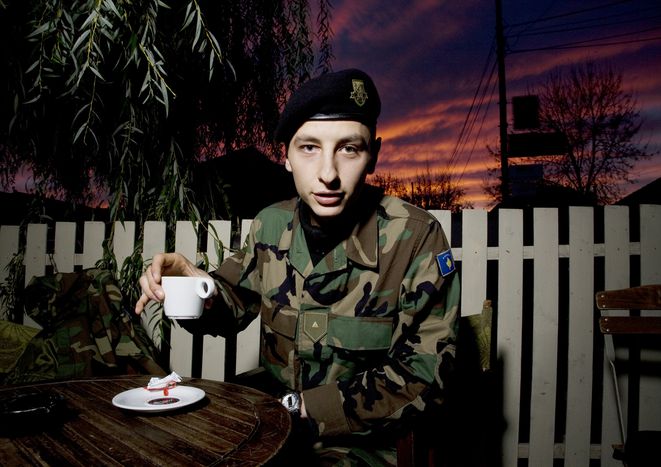
Young Kosovars in a country independent for four years (16 images)
Published on
Translation by:
 Olivia Hanks
Olivia Hanks
He wants to be a colonel, she wants to rebuild her country, he wants to travel to Asia on a motorbike. 'Newborn' by French photographer Clement Quentin is a series of portraits capturing the youth of today's Kosovo, no matter if they are Serbian or Albanian. 17 February 2012 marked the fourth anniversary of Kosovo's independence from Serbia, and is also a date which captures a country where 60% are currently under the age of 25, with over 40% unemployed

The letters erected in Pristina on the day of Kosovo’s independence in February 2008. They famously symbolise the birth of the country (Image: © Clément Quentin )

Liridon works for the Kosovo security force (KSF). 'When I was ten years old, I had to leave my home, my school and my friends without knowing whether I would see them again, all because of the massacres carried out by the Serbian army. I never want to go through that again.' After a year away , he dreams of serving his country as a colonel (Image: © Clément Quentin )

After studying medicine, Driton didn’t manage to find work – partly due to the high rate of unemployment (over 40% in 2012) but above all, he says, because of his Roma origins. 'Discrimination against Roma is a major problem in Kosovo. There’s no chance of getting out of the spiral of marginalisation. It’s hard to get out of it even by studying – the doors are closed.' Today, Driton is leader of the Balkan Sunflowers organisation, which works for social reconstruction at an everyday level among the Roma children in his village. He gives language lessons and organises outings and sporting activities (Image: © Clément Quentin)

'I feel as though I’m locked into my country. We can’t get out. Entry into the European union would open so many doors for us. I envy your freedom to travel where you like, but our passports aren’t worth the same. My government gives me authorisation to go to Albania, Macedonia or Haiti, whereas I dream of travelling to Asia on a motorbike' (Image: © Clément Quentin)

(Image: © Clément Quentin)

The village of Plemetina has the unfortunate reputation of being the most polluted village in Kosovo. It is situated less than a mile from the power station TC Kosova B, fuelled by the coal mines further north. 'The government built our village right next to the power station. Depending which way the wind is blowing, all the coal waste comes our way. You can’t stay outside for two hours without your clothes being blackened by the pollution. The majority of people here suffer from lung diseases. Living to the age of seventy in this village is a miracle' (Image: © Clément Quentin)

'The international community says it wants to help us, but how many civilians were killed by Nato bombs?' The American-led operation in 1999 washighly controversial. Contrary to what has too often been said, Nato did not militarily 'crush' Slobodan Milosevic’s Serbia, and civilians were once again the principal victims (Image: © Clément Quentin)

Bajram is so committed to helping others that he could be defined as a 'social activist'. He works for peace between different peoples through various organisations, such as Gaïa, among others. He defines himself as an artist, and is convinced that art and music in particular is a formidable weapon for conveying a message (Image: © Clément Quentin)

Albulena only acts in comedies or plays for children. 'Kosovo has suffered enough. I want to make people laugh and distract them, so that they forget their problems while they watch the show,' she says. To the question Would you like to leave Kosovo? she is quick to reply: 'Never! Even if life is hard here, I am proud to belong to this country. I have to stay here to help rebuild it' (Image: © Clément Quentin)

Kosovo has been a theatre of confrontation between two nationalist discourses for at least a century. Is Kosovo Serbian or Albanian? The question is still a source of conflict today. The Albanian majority is against giving the country's Serbian minority any rights. 'Nato intervened to put an end to the conflict,' remembers Sacha. 'In reality, peace hasn’t happened. The Albanians are in charge and the Serb minority has been relegated to the bottom of the pile. Your western televisions pass my people off as the latest incarnation of the nazis, but nobody talks about the murders of Serbs committed by Albanians.' There are still 125, 000 Serbs in Kosovo, isolated in enclaves like Gracanica, who are too afraid to leave their village (Image: © Clément Quentin)

In Prishtina this Albanian-Serb couple are truly symbolic. He doesn’t speak Serbian; she doesn’t speak Albanian. English has become their common language. Their bedroom is filled with posters depicting human rights, Gandhi and peace organisations. They have made their own philosophy out of it (Image: © Clément Quentin)

The town of Mitrovica is divided into two, and the famous bridge over the river Ibar symbolises the division of Kosovo – Serbs in the north, Albanians in the south. It doesn’t take much to maintain an atmosphere of fear and threat in Kosovo, given the long history of troubled relations between ethnic groups (Image: © Clément Quentin)

This is not a painter (Image: © Clément Quentin)

Art student: self-portrait (Image: © Clément Quentin)

Many young Kosovars go into higher education. They hope qualifications will help them to better their situation. Sadly, there is not enough work for all these graduates. The coffee shop terraces around the university are full of students talking about politics, literature, philosophy, but also about the frustration of not being able to work or to get out of their country (Image: © Clément Quentin)

(Image: © Clément Quentin)
Translated from Kosovo : le born again de l’Europe


